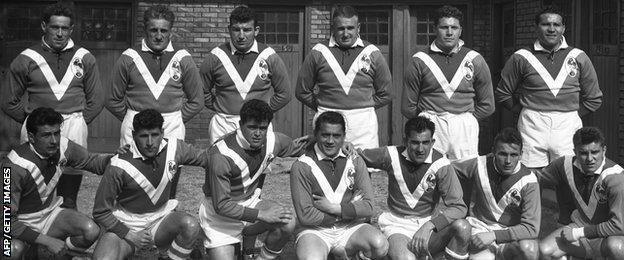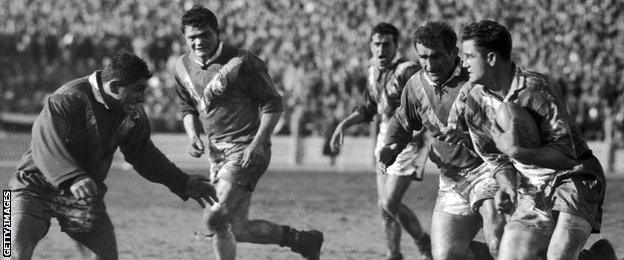Challenge Cup final: How Catalans Dragons represent French rugby league 'miracle'
- Published

Catalans Dragons beat runaway Super League leaders St Helens to reach the Challenge Cup final
Ladbrokes Challenge Cup final: Catalans Dragons v Warrington Wolves |
|---|
Venue: Wembley Stadium Date: Saturday, 25 August Kick-off: 15:00 BST |
Coverage: BBC One; BBC Radio 5 live sports extra & BBC local radio; live text commentary on the BBC Sport website |
For most rugby league clubs, reaching a Challenge Cup final is a wonderful achievement. For Catalans Dragons, given their history, it is a miracle.
The club emerged from the near ruins of two of the most historic clubs in France only 12 years ago, while the very game they play was almost crushed by Nazi sympathisers in World War Two.
So the fact that Catalans have gone from escaping relegation by the skin of their teeth to reaching a Wembley final in less than 12 months seems like small fry to what they and French rugby league have had to endure.
Now Catalans could become the first non-British side to win the world's oldest knockout rugby league cup when they take on Warrington at Wembley on Saturday.
And while sport can not always be depended on to deliver the perfect sentimental punchline, a win for the Dragons on Saturday would have Treizistes the world over raising a toast not just for the French game's triumph, but also its existence.
'Their intention was to kill off the game'
"Every time a French side takes to the field, we should stand up and cheer" goes the sentiment that reflects the game's ability to survive a Nazi death sentence in the 1940s.
"When rugby league was introduced to France in the 1930s by Jean Gallia, the country fell in love with the game," says Louis Bonnery, a former France international, a historian of the game and these days a television personality. "It was a big success."
That success, though, did not sit well with rugby union authorities in the country. And when a puppet Nazi government was set up in Vichy to rule the south of the country after the German invasion, rugby union sympathisers used their position in that government to ban the sport.
"Their intention was to kill off the game, everything was taken from rugby league. They thought it can never start again in France," says Bonnery.
"But many of those who were involved in fighting for the resistance in France were also lovers of rugby league. And when the war ended, they took that same spirit into making rugby league great again.
"People like Paul Barriere, who gave his name to the (rugby league) World Cup, and many others had all been involved in the resistance. They were not afraid of anything after what they had seen in the war."

This picture of the French national team was taken in 1953, a year before France were beaten by Great Britain in the final of the inaugural World Cup
Soon after the war, the French game began to attract big crowds again. In 1951, the national team, after a successful tour to Australia, were given a ticker-tape homecoming in Marseille.
Each player was given his own open-topped car, with his name written on the side, and the cavalcade drove through streets of the city, lined with hundreds of thousands of cheering French men and women.
It is an incredible image - the players of a sport banned in the country only a decade earlier, being feted as such national heroes.
But from that zenith, French rugby league was to mastermind its own nadir by the late 1960s.
"During that golden era for the game, they failed to invest in the future," says Bonnery. "It was also time for television to start becoming powerful, and we missed the chance to take advantage of that."

France were one of the leading forces of international rugby league during the 1950s, but a decline would follow
The game's governors wanted nothing to do with the new medium, fearing that allowing television cameras into their grounds would adversely effect the numbers of paying spectators they could attract.
Small-mindedly, they failed to capitalise on capturing an even bigger audience and profile, and slowly rugby league drifted out of the national conscience.
Since then, it has struggled to survive. Catalans Dragons were born out of that struggle.
Since the 1930s - apart from in those troubled war years - two major clubs existed close to the city of Perpignan.
XIII Catalans and St Esteve were bitter rivals; when they played each other it was one of the biggest derbies in French rugby league.
But at the turn of this century they were struggling to keep their heads above water in tough financial times. So local wealthy businessman Bernard Guasch took the lead in merging the two clubs, not only to ensure their future but also make a bold bid to leave the French leagues and join England's Super League.
"They were two rival clubs - like Hull KR and Hull FC," says Rudolph Pires, a rugby league commentator at BeIN Sport TV in Paris.
"It was impossible at first. But what unites the two clubs is the pride to be Catalans and that pride helped build this big club.
"It was called Union Treiziste Catalans at first - UTC - and became Catalans Dragons. It's quite unbelievable how they made it work."
Challenge Cup semi-final: St Helens 16-35 Catalans Dragons highlights
The new club had to win approval from their English counterparts, but finally got the nod to join Super League in 2005, ahead of two other French applicants - Toulouse Olympique and Villeneuve.
By 2007 they reached their first Wembley final, only to be beaten heavily by St Helens. But 11 years later, they are back. And after the way they beat runaway Super League leaders St Helens in the semi-final, many are giving them a real chance of toppling Warrington and lifting the trophy.
They would be the first non-English side to do that since the Challenge Cup was first played for in 1896.
So what would winning the cup mean for French rugby league?
"It would surely be a big boost for the game," says Pires. "It would show that the initial project of Catalans Dragons was good.
"And I hope, because we all hope, that following a win the mainstream media would talk about rugby league again and Catalans Dragons much more than what they do today."
'There is a madness about the team'
Perpignan is a working-class city; it does not have the glitz, glamour or wealth of some of its neighbours in southern France. About 4,000 will travel to London for the final, but many more will stay at home and watch on television, unable to afford the journey to see their team.
There is, Pires says, a social importance to a potential victory a Wembley.
"There is a close relationship between the people watching in the stands and playing on the pitch. Rugby league is a people's game," he added.
"People here are not wealthy, they are struggling economically. But there is a madness about the team. When the team goes well it is a consolation, you see the happy faces. When it is not the case, people go back to an ordinary life and it is not that funny."
So if the Dragons were to return to Perpignan with the Challenge Cup, if would ignite quite a party in the city.
It would also give hope to all French rugby league fans that the sport could find a place again in the national conscience.